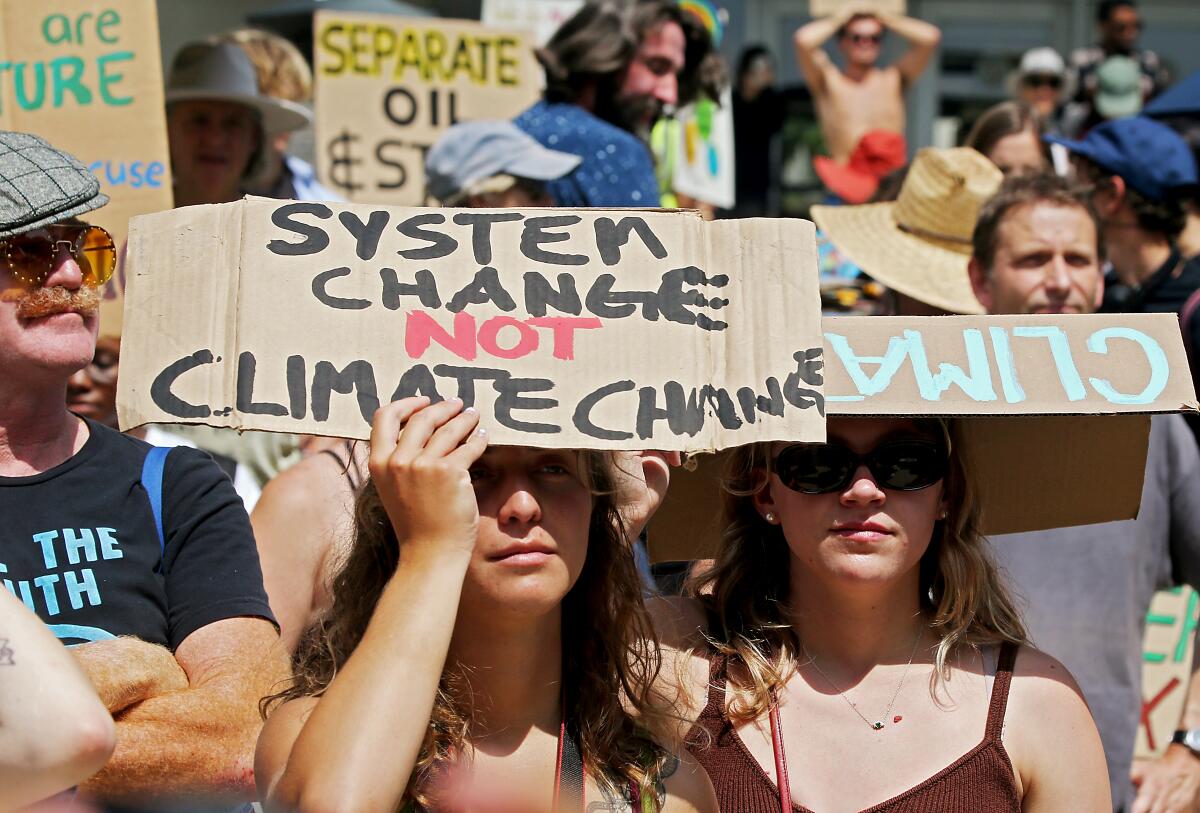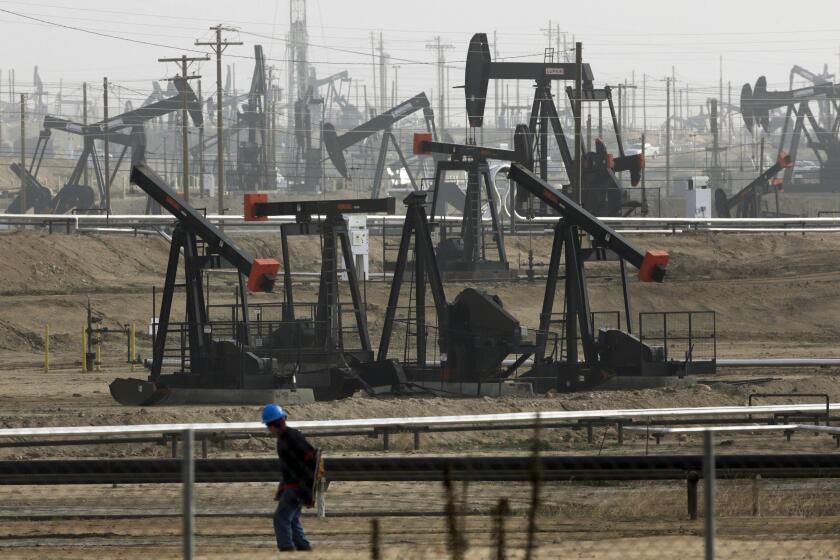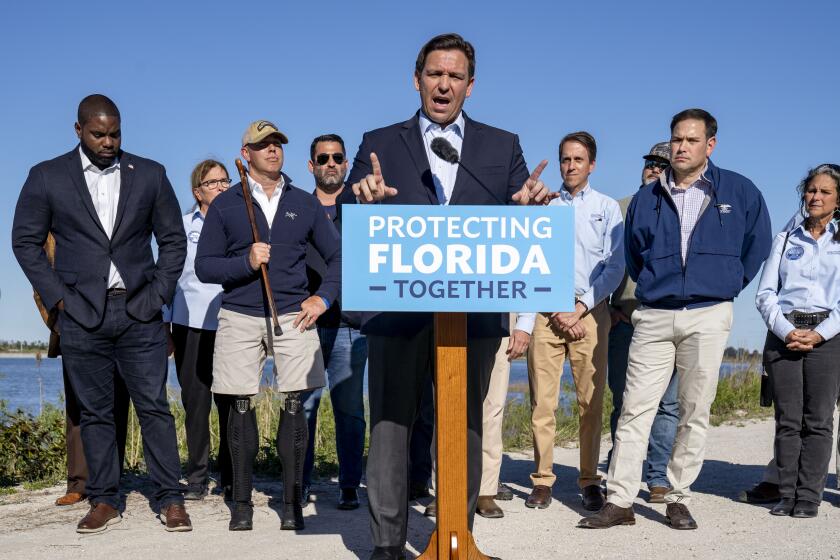Column: The oil companies lied to us about climate change. California should sue them into the ground

The oil companies want you to see California’s newly filed lawsuit over their decades of deceit about global warming as a “hypocritical ... Hollywood-and-foreign-billionaire-funded” effort to “starve the state of energy and hamper the economy.”
Well, they would say that, wouldn’t they?
The targets of the lawsuit, filed Friday in San Francisco County Superior Court, are five major oil companies and their subsidiaries. “From extreme heat to drought and water shortages, the climate crisis they have caused is undeniable,” Atty. Gen. Rob Bonta said after the filing. “It is time they pay to abate the harm they have caused.”
Climate projections reported by Exxon Mobil scientists between 1977 and 2003 were accurate and skillful in predicting subsequent global warming.
— Naomi Oreskes and Geoffrey Supran, Science Magazine
The state’s lawsuit joins others filed by at least 18 municipalities, seven states and the District of Columbia from New York to the West Coast in recent years in state and federal courts.
The industry asserts that the litigation is futile, pointing to scattered adverse rulings by judges here and there. But all those cases are still pending.
Get the latest from Michael Hiltzik
Commentary on economics and more from a Pulitzer Prize winner.
You may occasionally receive promotional content from the Los Angeles Times.
Big Oil is right to be concerned, for if even one crosses the judicial finish line, the path could be cleared for a massive financial reckoning in which the industry is forced to pony up for programs of mitigation and abatement. Think of the multibillion-dollar reckoning imposed on the tobacco industry, and multiply by infinity.
The oil lobby also points out that the real blame for petroleum-driven global warming lies with us, the public, and our unquenched demand for gasoline-powered cars and fossil fuels of every other description.
That’s fair, as far as it goes, but it didn’t save the cigarette companies after their role in the promotion of smoking through marketing and the suppression of scientific evidence of links between smoking and diseases was exposed. The harvest included a 25-year, $246-billion settlement reached in 1998 between the companies and state governments.
So let’s take a close look at the California case, which names Exxon Mobil, Shell, ConocoPhillips, Chevron and BP, along with the American Petroleum Institute, as defendants.
The state lawsuit doesn’t blame the oil industry for creating global warming, exactly. Rather, it seeks to hold the companies responsible for lying about it — specifically, for suppressing what its own scientists were saying about the consequences of burning fossil fuels.
BP and Shell made eye-catching promises to invest in renewable energy. If you’re shocked that they’re already backing off, you haven’t been paying attention.
Relying on oil, gas and coal for energy has pumped carbon dioxide, methane, nitrous oxide and other greenhouse gases into the air, trapping heat in the atmosphere and driving the average temperature higher.
It’s impossible to overstate the impact of the industry campaign against the truth. Oil companies spent millions on “advertorials” in major newspapers to discredit climate science and scientists, undermining public trust in their work.
They issued statements, pamphlets and briefs describing the state of climate science as unsettled. “Global Warming: Who’s Right? Facts about a debate that’s turned up more questions than answers” was the title of an eight-page pamphlet Exxon Mobil issued in 1996.
“Scientific evidence remains inconclusive as to whether human activities affect global climate,” its chief executive, Lee Raymond, wrote in the preface. “Many scientists agree there’s ample time to better understand climate systems and develop the best long-term strategies.”
All this has emboldened right-wing politicians to question findings of global warming, turning the climate crisis into just another partisan culture battle.
As the California lawsuit properly points out, this translated into decades of lost opportunities to advance policies to mitigate the coming crisis. Such policies might have led to “an earlier and quicker transition to cleaner energy sources” in California and across the country, in part by stepping up public pressure for investments in renewables.
Contrary to Raymond’s assurances, these consequences were anything but unknown to the oil companies. Exxon Mobil’s own scientific staff had begun warning as early as the 1970s that taking action to reduce greenhouse gases was an urgent priority.
“Climate projections reported by Exxon Mobil scientists between 1977 and 2003 were accurate and skillful in predicting subsequent global warming,” science historians Naomi Oreskes and Geoffrey Supran observed in Science in January. “ExxonMobil accurately foresaw the threat of human-caused global warming, both prior and parallel to orchestrating lobbying and propaganda campaigns to delay climate action.”
My colleagues at The Times produced a groundbreaking exposé of the oil industry’s deceptive tactics in 2015, in collaboration with the Energy and Environmental Reporting Project at Columbia University’s Graduate School of Journalism. Since then, we’ve continued to document its deceit.
How has the industry responded to these revelations? Chiefly by attacking those who have brought them to light, including the jurisdictions that have filed lawsuits against the energy companies.
They point to a “strategy session” held in La Jolla in 2012 sponsored by the Union of Concerned Scientists and environmental activists, as though there’s something nefarious about financial backing by the Rockefeller Family Fund (the endowment of which can be traced ultimately to, um, John D. Rockefeller’s Standard Oil, the forebear of Exxon, Mobil, Chevron, Conoco and dozens of other companies).
Blindly protecting investments in coal and oil without taking account of the changing world is a formula for impoverishment — environmentally, socially, and especially financially.
The Independent Petroleum Assn. of America breathlessly promoted a “bombshell” reported by Fox News that Leonardo DiCaprio’s nonprofit foundation had provided funding for some of the litigation. This scoop, the IPAA decided, “demonstrates that the climate litigation campaign is a national effort, and not a loose collection of state and local cases.” (No kidding?)
The IPAA persistently grouses about this outside litigation funding and advocates investigations into how it is “often used to bring frivolous or politically motivated lawsuits that enrich plaintiffs’ lawyers.”
Is this some sort of a gag? Rules requiring disclosure of third-party litigation funding might not be a bad thing in general. The problem isn’t public-interest nonprofits assisting public-interest plaintiffs, however, but real plaintiffs hiding behind frontmen and -women instead of suing on their own behalf. For example, Silicon Valley billionaire Peter Thiel bankrolling the lawsuit by wrestler Hulk Hogan that effectively put the celebrity-trolling website Gawker out of business.
Global warming litigation is still in its infancy, and plainly the judicial system doesn’t quite know what to make of it. The result has been some decisions in which judges agree that the plaintiffs have a point, but aren’t sure how to handle their claims.
In 2018, a federal judge in San Francisco wrote that he “accepts the science behind global warming,” but ruled that crafting a remedy for the damage fell outside his court’s jurisdiction. Another San Francisco federal judge ruled around the same time that lawsuits brought by Marin and San Mateo counties and the city of Imperial Beach against 29 oil companies belonged in state, not federal, court. They’re expected to be consolidated into one case and heard in state court next year.
Which legal strategy would have the best chance of prevailing is still unclear. The California lawsuit lists as causes of action state laws concerning public nuisances, pollution, untrue or misleading advertising or marketing, fraudulent business practices, product liability and negligence, in the hope that at least one of them will bear fruit.
Meanwhile, the oil industry continues to deceive the public about global warming and its efforts to address the crisis. BP and Shell, which promoted themselves as the most aggressive oil companies in shifting to renewables, both have quietly backed away from their pledges to invest heavily in solar and wind energy.
Nor has the industry backed off its efforts to undermine state environmental laws. California oil and gas producers have qualified a referendum for the 2024 state ballot aimed at overturning a new law setting a minimum distance between new oil and gas wells and places of human habitation and work, such as homes, schools and healthcare facilities.
They assembled a war chest last year of more than $20 million. You probably won’t lose a wager that they’ll be spending their millions, as I wrote a few months ago, on “a campaign of deceit and balderdash typical of attempts by businesses to overturn regulations they don’t like (which is most of them).”
To put it another way, the reckoning is still somewhere over the horizon. But it needs to happen.
More to Read
Get the latest from Michael Hiltzik
Commentary on economics and more from a Pulitzer Prize winner.
You may occasionally receive promotional content from the Los Angeles Times.











